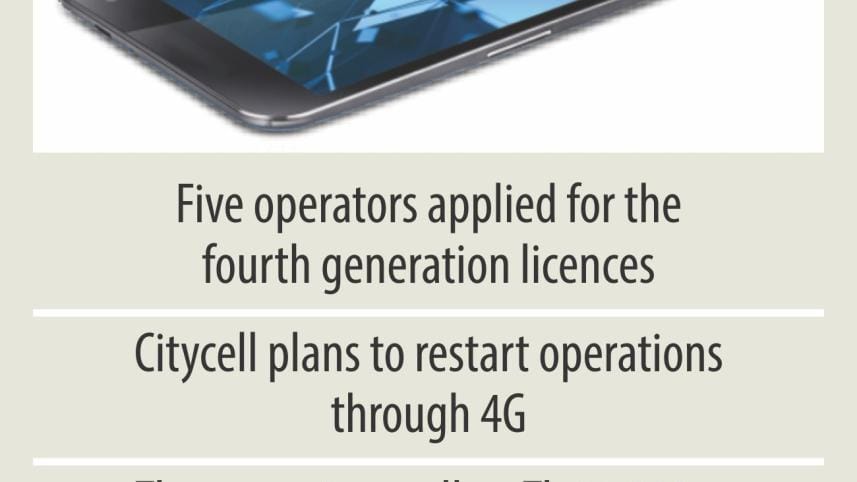4G services by March

Mobile internet users, especially in city areas, can brace themselves for super-fast data service from March as all operators are set to roll out 4G service, said the top brass of the telecom regulator yesterday.
The Bangladesh Telecommunication Regulatory Commission yesterday received five applications for licence to provide 4G service, which will ensure 20 mbps speed even from mobile phone.
State-run Teletalk and now out-of-service Citycell also applied for licences.
All the private entities will now sit in the spectrum auction scheduled for February 13.
However, Teletalk will not attend the auction as they have not applied for spectrum, said Shahjahan Mahmood, chairman of the telecom regulator, at a press conference at his office.
"Maybe Teletalk thought their existing spectrum was good enough for offering 4G data service."
The state-run operator currently has 25 Megahertz of spectrum across three bands.
After getting the licence and paying the spectrum fees, the mobile operators can offer 4G service to their customers, Mahmood said.
"We have been informed that all the top operators are technically ready to offer this service."
Market sources said the top three private mobile operators are prepared to roll out 4G service and currently working on converting the SIM cards and developing the ecosystem.
Mahmood said, after launching this fastest mobile data service the country will move one step closer towards digitisation.
The BTRC has already formed two separate committees to evaluate the applications for licences and spectrum auction; the qualified applications' list will be published on January 25. A mock auction will be organised on February 12.
Citycell, which stopped providing service in October 2016, is also preparing to re-enter the telecom business after it got a foreign investor, according to one of its top executives.
All mobile operators that have 3G capability will qualify for 4G licences if their documentations are in order. However, since Citycell does not have 3G, it will have to purchase spectrum from the auction.
Though the BTRC has put a provision in the 4G guideline to facilitate participation of new entities, there was no new application. "It is tough to get any new party but if any application is received the BTRC will send it to the government for their consideration. We have not shut the door to foreign investors," Mahmood said.
Earlier in the day, the Supreme Court cleared the way for the BTRC to give out 4G licences after it extended its chamber judge's order that stayed a High Court directive halting the auction.
On Thursday WiMAX operator Banglalion filed a writ petition on publishing advertisement for awarding 4G licence. Banglalion got the stay order and on the same day chamber judge halted the order.
According to the BTRC guideline, operators have to pay an application processing fee of Tk 5 lakh, a licence fee of Tk 10 crore and an annual fee of Tk 5 crore over the 15-year licensing tenure for 4G.
All the licensees will have to deploy 4G network across the country within three years of getting the licences, according to the guideline.
At the auction, the BTRC will place a floor price of $27 million for per MHz in the 2,100 MHz band; a total of 25 MHz spectrum will be made available.
It will also put up for sale 18 MHz in the 1,800 MHz band and 3.4 MHz in the 900 MHz band, both starting off with $30 million per MHz.
Operators will have to pay separately for technological neutrality of their exiting spectrum if they want to offer any service (2G/3G/4G) from any of their frequencies.
If any operator makes its entire spectrum neutral it will have to pay $4 million for each MHz. However, for partial conversion the charge will be $7.5 million for each MHZ. And in every segment 15 percent value-added tax will be applicable.
BTRC is not expecting higher earnings from spectrum sale but a significant amount will come from technological neutrality fee, said a commissioner of the regulator. As per the BTRC's rough estimation, the government can earn Tk 11,000 crore if the entire spectrum is sold out.
Though the guideline has been amended twice, the private mobile operators still have some worries about unresolved issues concerning VAT, the fibre optic network and the mandatory speed of 20 mbps.
The BTRC last arranged an auction for 3G spectrum in 2013 and the operators rolled out the service right after.



 For all latest news, follow The Daily Star's Google News channel.
For all latest news, follow The Daily Star's Google News channel.
Comments